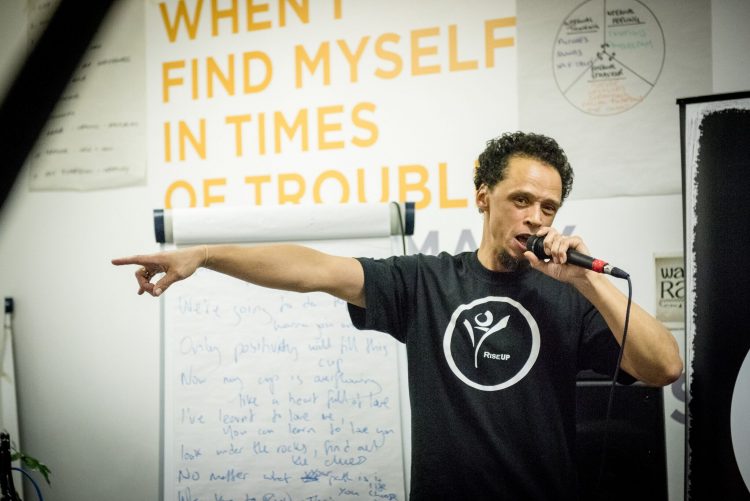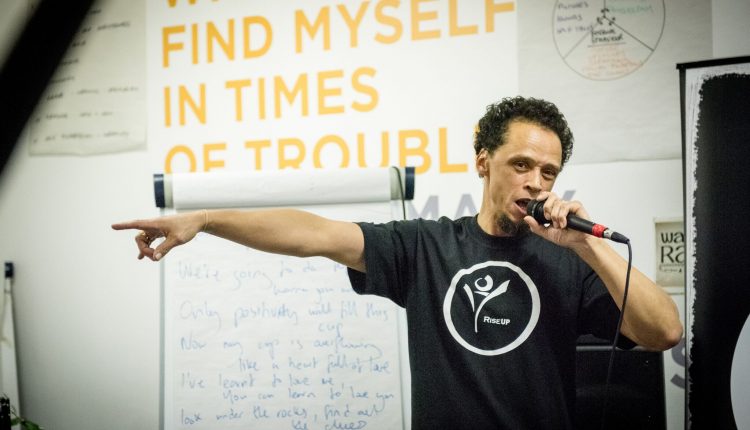‘Many people think they don’t have a choice – they do’
Growing up in Merseyside, Ashleigh Nugent was targeted by police because he was black and his life spiralled out of control. Now a successful author and entrepreneur, he offers a postive pathway to those in prison and at rock bottom. Tony McDonough reports

Ashleigh Nugent was 14 when he was arrested by the police for the first time. He was a black kid in Rainhill, a predominantly white area of Merseyside.
“It was a shock,” said Ashleigh. “Until then I had been a happy-go-lucky child. No one had had those conversations with me and prepared me to expect that adults in positions of authority would be racist.”
He had just been hanging around with his friends in the park when he was wrongly accused of stealing a bicycle from outside a chip shop. He added: “They locked me up for a few hours and then took me to court and tried to get me to plead guilty to something I hadn’t done.
“People in the chip shop had seen the lad who stole the bike. He was a white lad with blonde hair and a well-known thief, which I wasn’t.”
It was a pattern that continued for the next few years with Ashleigh a persistent target for police harrassment. Three times before he was 17 Ashleigh was arrested and then released without charge. He began to hate all authority.
His parents complained to the police and to their local MP, all with little effect. Gradually, Ashleigh’s sunny disposition melted away and was replaced by an angry and resentful young man. Racist police perceptions that Ashleigh was trouble eventually became a self-fulfilling prophecy.
“I wanted to become renowned for being a tough guy and there was a lot of violence and selling drugs,” he said. “It was a very promiscuous lifestyle. I felt I had a lot to prove. That continued until I was 21.”
When he was 16, Ashleigh took a trip to Jamaica with his brother. By his own admission he was very naive and tried to live up to a stereotype. He explained: “I tried to act as ‘black’ as possible. I had been singled out as being different so I decided to play up to that.”
However, the Jamaican police just saw him as a rich kid from England. He was stabbed and mugged but it got him little sympathy. He spent almost three weeks locked up after he was found in possession of a handful of spliffs, but managed to flee the country.


Ashleigh’s downward spiral continued until he was 21 when he utilised his considerable talent for writing and expression to rewrite the script of his own life. Fast forward to the present day and Ashleigh is a successful author and entrepreneur.
Along with business partner Stuart Coady, Ashleigh formed a community interest company (CIC) called RiseUp in 2015. It runs programmes in prisons across the UK, offering people who were part of the criminal world a path to a different life – if they choose to take it.
And this is the conundrum for those wanting to help people who have slipped into a life of crime, violence and self-abuse. It is rarely effective to stage an intervention if the people themselves do not want to change at that moment, says Ashleigh.
“I am not trying to tell people what to do. I am here to offer information – I say ‘you can help yourself if you want to’,” he explained. “But they have to make that choice themselves. No one can make them do it.”
RiseUp’s 12-stage programme has yielded remarkable results. And though he insists the programme involves the input of multiple professionals he acknowledges he can reach people others cannot. He has been where they have been, he has seen the world as they see it – and he has enacted change.
In Ashleigh’s case his path to change was through writing. He said: “Writing changed everything. I had always written poems and stories. And I had left school with no qualifications but I just wanted to express myself. I got tired of having this secret thing that I did that no one knew about.
READ MORE: £1,000 on offer for Merseyside social businesses
READ MORE: Businesses reach out to Wirral Homeless
“There was a drive within me to do something with this but I didn’t know where to start so I decided I had to go to college to meet people who did know about this stuff. At college I met a guy who introduced me to a load of other people who are still my friends now.
“Some of them were starting a band and they suggested I start rapping some of my poems in the band. I had mates that worked the doors in town and I was turning up to rap. That was a very scary transition for me.
“I was still up and down with my actions at that point but I gradually started to read a lot more. I was now hanging around with writers and poets and artists who were into books and I felt I had to catch up with them. I thought ‘how can I call myself a writer if I don’t read, if I don’t know anything?’.”
Ashleigh, who now lives in Wirral, began to study hard, a habit he maintains to this day. He won a place at university and graduated with a First Class degree in English literature. He added: “I thought that if I am here with the swots then I am going to beat them.
“One thing I say to people in prison is that if you change your purpose then your character will change to fit that purpose and your actions and your values, beliefs – everything changes to fit that purpose. Your environment changes and you start creating your own reality.”
While he was at university Ashleigh saw his first article published which proved to be a massive boost to his confidence: “It made me believe that I really could do this and that people will take me seriously.”
He secured a job as a community outreach artist with the Royal Liverpool Philharmonic Orchestra, going into schools. It was a role he continued in for 17 years. He eventually started his own outreach business, sending people into schools. He added: “Gradually I learned more and more about how to control my own life.”
Following the financial crash, in 2010 a coalition of the Conservatives and Lib Dems formed a Government and Chancellor George Osborne set in train policy of austerity. This meant the gutting of public services. The axe fell particularly hard on the justice system, including the probation service.
“When the Tories got into power, I knew there would be no more funding for arts and education,” said Ashleigh. “I had always wanted to work in prisons. I thought the message I had would be most effective there. I wanted to help people at their lowest ebb.”
A reorganisation of the probation service opened the door for third sector organisations to start working with prisoners. Ashleigh and Stuart, who had himself hit rock bottom during a period of homelessness, spent a year researching and planning their programme. And in 2015 RiseUp started its work in the prison service.
“We work all over the country and we have achieved some really fantastic results and are helping people to see how they can change their own lives,” said Ashleigh.
“It is so difficult to measure. We have spent a lot of time and money adapting our impact measurement and ‘theory of change’. We measure at the beginning, middle and end and we get a lot of written feedback from people about what the programme has done for them and how it may have changed their outlook on their own lifestyle.
“In prisons, now, I tell people the system isn’t here to serve you and you have a right to your dignity. But you have to think about what you want to get out of the system. Lashing out won’t get you anywhere. Is the criminal lifestyle really going to get you what you want out of life, or not?
“I hear my own experience in them. And that is why they connect with me. We have about eight or nine people running a 12-session programme. It is not just about me. I do the first few sessions and normally the final sessions.
“They are hearing from someone who knows what lifestyles they have lived and knows about the conversations that go on in the places they have lived in. I am not trying to tell people what to do. I am here to offer information – I say ‘you can help yourself if you want to’.
“One of the reasons that the probation system does not work is that it is patronising. People have no interest in being talked down to or patronised or treated like a child. It just is not going to work. They will sort their own life out if they choose to.”
It’s a theme Ashleigh always returns to. The idea that people always have choices even when they think they don’t. And he passionately believes this philosophy applies to everyone, not just those in prison.
He explained: “People can become aware of how their feelings and emotions work and why they do the things they do. Why do we sometimes do negative things when we are looking for a positive result?
“We keep getting the things we don’t want but we can’t get the things we want by pushing against the things we don’t want. Once people understand this they can then make the choice. It is actually quite simple to understand – we always have a choice over what we do.
“How I respond to the external stimuli is up to me. I can’t blame other people, or the system or my mum and dad or anyone. It is about how I choose to react. And once people get that it is like ‘what are you going to do?’. You can carry on with your crazy lifestyle but is it going to get you what you want?”

It was writing that helped turn Ashleigh’s life around and writing still plays a major role in his life. In September 2020 his debut novel, Locks, was published. Although ostensibly a work of fiction, much of the book is based on the real events in his life.
He is also working with the new Shakespeare North Playhouse in Prescot. He will be co-curating the opening weekend in July. He buzzes with excitement when he points out: “My name is in there with Jonny Vegas and Jimmy McGovern.”
Through his writing, Ashleigh wants to reach a wider audience. He has spoken to TV executives and believes there would be a huge value in a documentary on his life
He added: “There is a direct link between my work and the writing. Who knows how far this will go. We need to use my story. The more we can do that the more we can help and maybe inspire more people to change their own lives.
“This programme was all about the prisons but we also wanted to work with the long-term unemployed and support people when they leave prison. That has proved very difficult because the probation service has been in such disarray. Support for people who are long-term unemployed under the Tories has been utterly awful.
“Many people think they don’t have a choice. Once they are aware they do they realise it is on them. The Government, the Prison Service, their mates, they can do whatever they want, but it is up to you how you respond. Nelson Mandela was in prison for 27 years. He responded positively. So can you, if you choose to.”

